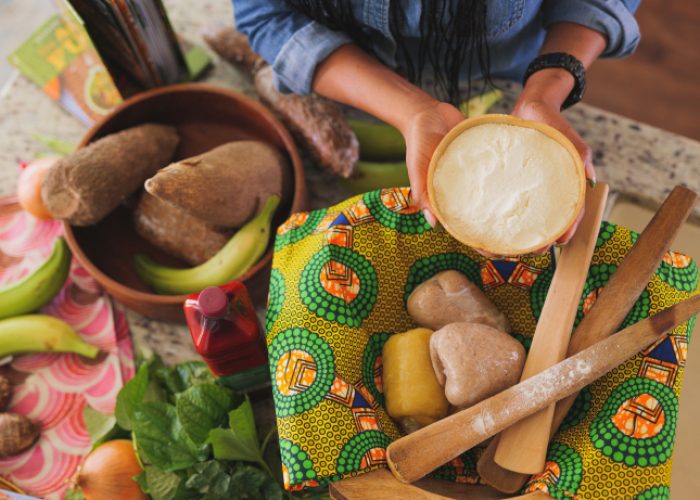The love, tales, history, and art of ‘fufu’ is the reason why the Ashanti people of Ghana say that “A man has not eaten a day unless he has eaten fufu”. Amen to that!
I bet you’re asking yourself; ‘fufu is just a type of food, what’s so special about it?’ or you’re saying to yourself ‘it’s not that deep, fufu is just like any swallow’.
All valid thoughts to have, but before the end of this write-up, you’d find that fufu is more than just another type of food, and perhaps, this would influence your next meal.
The deliciousness of fufu is the reason why men and women do not mind sitting in front of giant mortars and pestles to pound boiled starchy foods like plantain, cassava, and yams so powerfully until they become gummy, uniformly textured, smooth, fine, and soft to swallow. Oh! The very joy of fufu is worth every sweat!

When it comes to West African cuisine, you can’t have enough, especially when you pair a staple like ‘fufu’ with mouth-watering soups like Ogbono, Okra, Egusi, or Banga garnished with beef, snails, fish, oysters, periwinkles, stock fish, prawns, or any protein of your choice that will leave you swallowing, chewing, licking your fingers, and reaching for the next morsel of fufu as soon as you catch your breath.
The health benefits of fufu are what make it such a nutritious powerhouse. It is low in cholesterol, and high in fiber, potassium, and resistant starch, which feeds the bacteria in your gut and may help to reduce inflammation and promote digestive health. It also contains vitamin C, thiamine, riboflavin, and niacin.
Fufu has a long history of being that particular carbohydrate that will leave you full and yet tasty for more. Let’s not even talk about how it sends you straight to bed when you’re done. Alas, it is not for the faint of hearts.
Fufu is one of Africa’s most priced generational gifts and if you haven’t had it yet, I bet by now, you already know what to do.




